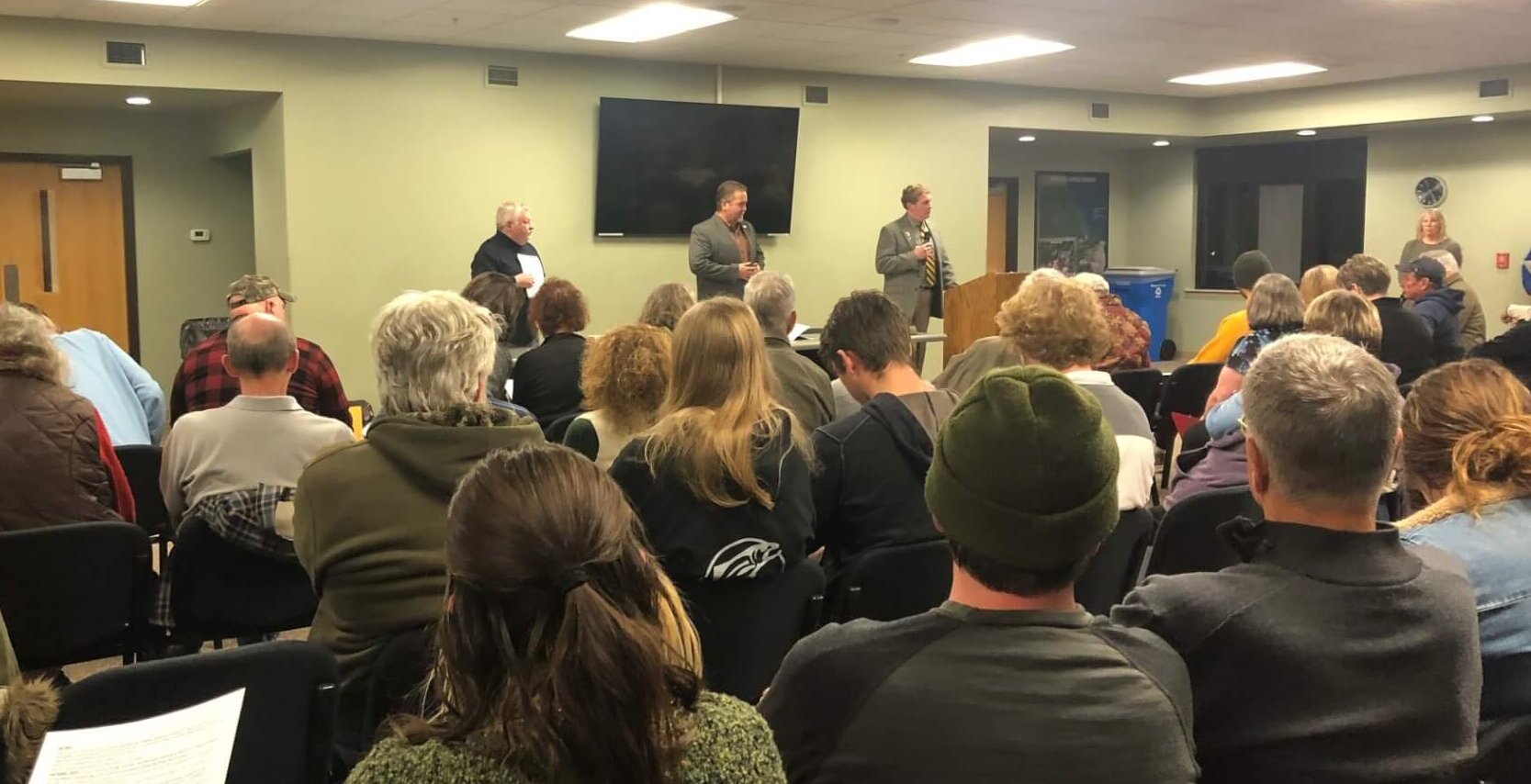State Senator Ed McBroom, along with Representatives Dave Prestin and Greg Markkanen, all of the Upper Peninsula, hosted an Energy Town Hall meeting last night in Marquette Township.
A standing-room-only crowd showed up to hear what the three Republican elected officials had to say about new bills dealing with the move away from fossil fuels and into renewables for energy production statewide. The legislation is headed for the governor’s desk, having already been approved by the Democratic dominated House and Senate.
The somewhat informal meeting lasted two hours but could have gone a lot longer if not for McBroom’s merciful adjournment. After brief presentations by the hosts, audience members were given the opportunity to ask questions and make comments… with no time or content restrictions. Fortunately, those taking the mic were by and large mindful of what kind of mental tedium unrestricted commentary could induce.
As governmental issues go, this one has more juice than it takes to power the entire Upper Peninsula, because that’s what it’s about.
To make a very long story short, here’s the skinny. The Michigan Legislature, again… controlled by Democrats, has passed bills that will require utilities to draw all their power from clean sources by 2040. The move is designed to address the global issue of climate change.
According to McBroom, issues dealing with energy generation have always been decided with bi-partisan agreement. Not so with these new bills. Republicans are largely opposed, suggesting, according to Prestin, “The technology is not there.”
Democratic State Representative Jenn Hill of Marquette is a staunch supporter of the bills, but due to a scheduling conflict, she was unable to attend the meeting and offer her views. McBroom indicated she was indeed invited, but a few commenters expressed disappointment she wasn’t better accommodated. It would have been nice if she’d been there, but it sounded like she’s planning a town hall of her own to look at the issue from the other side of the aisle. Watch for it.
One commenter went political with, “The people who voted for this are committing political suicide, and that includes Jenn Hill!” Maybe. My internal applause-o-meter indicated that most of the crowd reaction was in favor of the legislation, but we’re still very early in the public relations part of the process.
Objections from those opposed to the action cited legitimate concerns, including, but not limited to: cost, timing, feasibility, cost, the process, unproven technology, cost, and… did I mention cost?
For example, do you remember when the Marquette Board of Light and Power built those natural gas units to replace the coal-fired Shiras Plant? You should. It wasn’t that long ago. Well, if the governor signs the bills and no changes are made to the mandates, it’s possible we’ll still be paying for those shiny natural gas generators long after they’re done producing any power.
To their credit, McBroom, Prestin, and Markkanen all indicated support for an eventual move to renewables, but not until the technology catches up to our actual energy needs. Does the sun shine enough to make solar a viable and dependable source? Can we efficiently store power generated from windmills when we have a few windless days? And does it make sense to come up with a blanket set of rules and regs for a state with widely variable geography and weather patterns?
But most of the concern boils down to the timeline. As pointed out by Prestin, power companies and the industries that depend on them don’t operate with long range plans that refer to the third or fourth quarter. They’re dealing in years, or decades, of advanced planning. 2040? As I said, in 2040 we’ll probably still be paying for the last new thing.
The move to renewables, nationwide, is going to happen. And as was justifiably suggested by more than one commenter in support of the legislation, if we don’t push for it now, we’ll just keep putting it off… until Lake Superior is the “world’s biggest hot tub.” (My words.)
A reasonable solution would seem to be some form of grandfathering of our current systems until they’re ready to be replaced. Power derived from renewables is a worthwhile goal, but at what cost? McBroom pointed out it wasn’t that long ago when constituents were clamoring for natural gas to replace coal. Done. Now the same people are back demanding renewables to replace natural gas. Fine. Where do we send the bill?
Apparently the state’s Public Service Commission is planning a study that could relieve some areas, like the Upper Peninsula, of new regulations deemed invalid or simply unnecessary. So there’s that. Otherwise, changes are coming, whether we’re ready or not.
A major factor in all of this is the ever-present fear of the unknown, as in… will it work, and what will it cost? One commenter suggested the move to renewables will be a step towards energy independence. McBroom agreed, but qualified it with, “Independence also demands affordability.”
The bills are identified as SB 271, SB 273, SB 502, HB 5020, and HB 5021. To see them for yourself, go to legislature.mi.gov.


